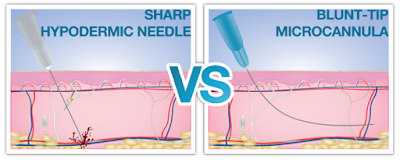This blog poses an interesting question - should your facial aesthetics doctor use a sharp hypodermic needle OR a blunt-tip cannula for treatments and procedures?
With the increasing interest of facial rejuvenation to maintain a youthful appearance, minimally invasive procedures are becoming more popular.
The use of dermal fillers to soften the appearance of wrinkles and folds as well as restore volume and contour has grown exponentially over the last decade.
The type, grade and application of dermal filler have also changed and we now have more than 250 brands of dermal fillers in Europe.
Most dermal fillers now come incorporated with a local anaesthetic agent to minimise the level of discomfort during the procedure. In spite of all the different brands, the one thing they all have in common is that they come pre-packed with a sharp hypodermic needle of varying diameter.
In Scotland, the majority of practitioners still use sharp needle for injecting dermal filler because these needles come free within the packaging. At our Glasgow-based cosmetic surgery practice, Essence Medical Cosmetic Clinic, Dr Kieren Bong – known internationally as the ‘Master of Contouring’ – rarely uses a sharp needle for the injection of dermal filler in the face. So what’s wrong with needles? And what’s Dr Bong’s reasoning behind his decision?
What’s wrong with sharp hypodermic needles?
Sharp tipped needles have several adverse characteristics. They are, of course, sharp and during their introduction into the skin they will:
lacerate blood vessels
require repeated insertion to re-position
cause damage to surrounding tissue
cause bruising
they may terrify the patient
What are the areas of the face where blunt-tip cannulas can be used?
Full face restoration of volume and contour
Nose to mouth lines
Marionette lines
Softening under-eye hollows
Lips contouring
Defining jaw line
What are the advantages of using blunt-tip cannula?
In Dr Bong’s opinion, The blunt tip cannula provides a great number of distinct advantages and is an impressive alternative to sharp tipped needles:
Superior patient comfort – the procedure does not hurt as much as using sharp needles.
Minimising risk of bruising – with no bruising, patients may really return to work or attend social events immediately after the treatments.
Patients who may be needle phobic feel more reassured that it is a blunt-tip instrument and will be further reassured by the genuine lack of pain.
Because the cannula is a small, blunt and flexible instrument, it simplifies the filler injection process by requiring fewer punctures.
Blunt-tip cannulas have the ability to cover a greater area in a single treatment. One or two entries with the cannulas can fill approximately half of a patient’s face versus the sharp tipped needle which requires multiple penetrations and covers less area.
For a consultation with Dr Bong to discuss your facial aesthetics requirements please contact our clinic reception team on 0141-8949098 or 0800 680 9098 or use our contact form to book.
This article originally published at Essence Medical Cosmetic Clinic Blog here
With the increasing interest of facial rejuvenation to maintain a youthful appearance, minimally invasive procedures are becoming more popular.
The use of dermal fillers to soften the appearance of wrinkles and folds as well as restore volume and contour has grown exponentially over the last decade.
The type, grade and application of dermal filler have also changed and we now have more than 250 brands of dermal fillers in Europe.
Most dermal fillers now come incorporated with a local anaesthetic agent to minimise the level of discomfort during the procedure. In spite of all the different brands, the one thing they all have in common is that they come pre-packed with a sharp hypodermic needle of varying diameter.
In Scotland, the majority of practitioners still use sharp needle for injecting dermal filler because these needles come free within the packaging. At our Glasgow-based cosmetic surgery practice, Essence Medical Cosmetic Clinic, Dr Kieren Bong – known internationally as the ‘Master of Contouring’ – rarely uses a sharp needle for the injection of dermal filler in the face. So what’s wrong with needles? And what’s Dr Bong’s reasoning behind his decision?
What’s wrong with sharp hypodermic needles?
Sharp tipped needles have several adverse characteristics. They are, of course, sharp and during their introduction into the skin they will:
lacerate blood vessels
require repeated insertion to re-position
cause damage to surrounding tissue
cause bruising
they may terrify the patient
What are the areas of the face where blunt-tip cannulas can be used?
Full face restoration of volume and contour
Nose to mouth lines
Marionette lines
Softening under-eye hollows
Lips contouring
Defining jaw line
What are the advantages of using blunt-tip cannula?
In Dr Bong’s opinion, The blunt tip cannula provides a great number of distinct advantages and is an impressive alternative to sharp tipped needles:
Superior patient comfort – the procedure does not hurt as much as using sharp needles.
Minimising risk of bruising – with no bruising, patients may really return to work or attend social events immediately after the treatments.
Patients who may be needle phobic feel more reassured that it is a blunt-tip instrument and will be further reassured by the genuine lack of pain.
Because the cannula is a small, blunt and flexible instrument, it simplifies the filler injection process by requiring fewer punctures.
Blunt-tip cannulas have the ability to cover a greater area in a single treatment. One or two entries with the cannulas can fill approximately half of a patient’s face versus the sharp tipped needle which requires multiple penetrations and covers less area.
For a consultation with Dr Bong to discuss your facial aesthetics requirements please contact our clinic reception team on 0141-8949098 or 0800 680 9098 or use our contact form to book.
This article originally published at Essence Medical Cosmetic Clinic Blog here





